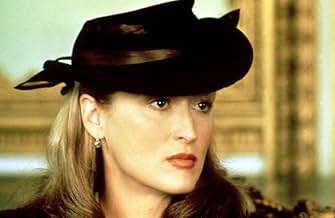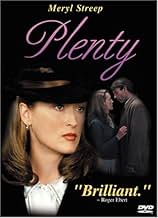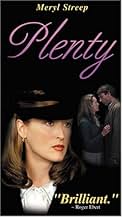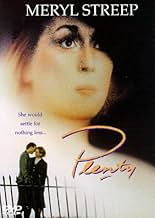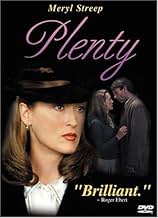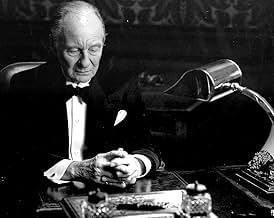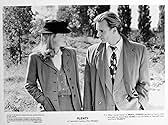AVALIAÇÃO DA IMDb
6,0/10
3,5 mil
SUA AVALIAÇÃO
Uma jovem inglesa passa vinte anos tentando construir seu próprio estilo de vida, às custas dos outros ao seu redor, na Inglaterra pós-Segunda Guerra Mundial.Uma jovem inglesa passa vinte anos tentando construir seu próprio estilo de vida, às custas dos outros ao seu redor, na Inglaterra pós-Segunda Guerra Mundial.Uma jovem inglesa passa vinte anos tentando construir seu próprio estilo de vida, às custas dos outros ao seu redor, na Inglaterra pós-Segunda Guerra Mundial.
- Indicado para 2 prêmios BAFTA
- 2 vitórias e 5 indicações no total
André Maranne
- Villon
- (as Andre Maranne)
Avaliações em destaque
In "Plenty" (***1/2). Meryl Streep gives one of her greatest performances in the complex role of "Susan Traherne", an idealistic young Englishwoman whose compulsive need to stir things up comes in conflict with a crippling lack of courage. We follow her life from her days in the French Resistance at the end of World War II to her professional and emotional decline during the 60's. Her key line: "I want to change the world, but I don't know how." The supporting cast, production and direction are superb, and the score by Bruce Smeaton is hauntingly beautiful. The character functions as both a metaphor for postwar England and a real flesh and blood human being, although it's a flaw that we don't learn more about her family background, apparently an upper class one, which might have contributed more to an understanding of her later, often perverse, behavior. The only two people she seems to have in the world are Charles Dance, playing her long-suffering diplomat husband and Tracy Ullmann, wonderful as her free-spirited best friend, probably the kind of person Susan would like to have been if it were not for her "fatal weakness": she likes "losing control." This film has been newly released in its original Panavision dimension on DVD and looks terrific. Seeing it the way it should be seen only enhances my opinion that it's one of the most underrated movies of the 80's.
This is a film where you can get lost, wonderfully lost. Following Susan, the character created on the page by David Hare and on the screen by Meryl Streep, is a journey of gloriously unexpected ups and downs. It may be because the amazing Meryl Streep goes trough the analytic intellect of David Hare with her heart on her sleeve and I felt shattered and moved by the access she provided me into the heart and soul of her own personal labyrinth. To look back with regret and feel that memories of fleeting moments of extraordinary beauty can keep you going and see you through whatever hell fate seems determined to throw your way. Meryl Streep never looked this beautiful and the transparency of her missteps are a magic sweep of the most enthralling kind. Irrationaly sane. Like most of the great bipolar. They know, they've seen through. There is nothing ahead only behind and now it's too bloody late. The stages of Susan's journey, to the after war lands of plenty are framed by her own geniality - the character's and the actress's - Susan is overwhelmed by her own awareness, lonelier and lonelier, Meryl overwhelm us with her own sublime generosity. Fred Schepsi, the extraordinary man at the helm, keeps the puzzle open and clear. Like most works of art, not everyone will be ready to open up to this experience. Pretty frustrating let me tell you. I would love to share this experience with everyone.
9RG-5
"Plenty" needs to be seen on a big screen in a theatre; more than most, this is a film that suffers in its translation to a TV screen. (Among other things, there are scenes that are simply ruined in the format change--like the hilarious scene of Streep and Sting on a sofa as Queen Elizabeth's coronation plays live on the tellie!) Sound is also important to fully appreciating the film--like the constant reminders of the sound of opening parachutes that echo throughout the story.
It's easy to understand why the film was not a box office success; it focuses on a woman who is not terribly likeable, but I contend that it is a movie rich in observations that transcend post-war Britain and the borish woman who develops in that milieu. "Plenty" is (among other things) about passion, diplomacy, memory, self-deception and the great expectations that are so easily squashed in our unheroic modern world. The film (and Hare's play before it) revolves around a crucial scene brilliantly played by a startlingly mad Streep and Ian McKellan's icily insightful foreign service officer--well past the film's mid-point. After his long-in-coming dose of reality, Streep's Susan takes a tailspin into the movie's melancholy conclusion. It's not an easy film to "enjoy," but the uniformly brilliant performances from Streep, Charles Dance, Tracy Ullman and John Gielgud make the film fascinating to watch and rewarding to have experienced.
It's easy to understand why the film was not a box office success; it focuses on a woman who is not terribly likeable, but I contend that it is a movie rich in observations that transcend post-war Britain and the borish woman who develops in that milieu. "Plenty" is (among other things) about passion, diplomacy, memory, self-deception and the great expectations that are so easily squashed in our unheroic modern world. The film (and Hare's play before it) revolves around a crucial scene brilliantly played by a startlingly mad Streep and Ian McKellan's icily insightful foreign service officer--well past the film's mid-point. After his long-in-coming dose of reality, Streep's Susan takes a tailspin into the movie's melancholy conclusion. It's not an easy film to "enjoy," but the uniformly brilliant performances from Streep, Charles Dance, Tracy Ullman and John Gielgud make the film fascinating to watch and rewarding to have experienced.
David Hare's brilliant stage play has been translated beautifully to the screen. The peculiar English trait of natural melancholy radiates throughout this sad exercise of seeing all through the lens of British class consciousness, repression and despair. The color photography, the performances, the stifling framing of the widescreen shots all add to the oppressive beauty of a story about the self-destruction of a preternaturally beautiful woman. Mery Streep has never been better before or since. Hare makes her intellectual acuity a weapon against herself as she sees through all the ghastly pretenses of a corroding Empire. No insight, no beauty of body, no letting go of formality and pretense can save her from herself. Feminism itself is taken to the burning stake as Streep's character thrashes, Hedda Gabbler like, against walls and prohibitions beyond her understanding. Rarely has such condemnation looked so ravishing.
There is now and has been since 1985 a lot of conjecture as to what this film is about. The reaction I had after I first saw this film was one of the first times I was genuinely depressed after I had seen a film. Depressed by an outside force not from within myself. Women in my family were of the similar age Meryl Streep's character of Susan Traherne...so I asked them how they felt during the war and after. Their candid replies (not prompted by any film discussion either) led me to believe PLENTY was a state of mind, a post war feeling of "winner's feast after survival"...I came quickly to realize Susan Traherne, her men, her lovers, her descent into disillusionment, unhappiness, into madness, irrationality. the realization she had to live with herself and her gauche cruelty, snobbery, foolishness and self deceit... was about Great Britain herself, Susan is the Nation, Brittania. PLENTY is possibly the saddest film I have ever seen, on par with MILLION DOLLAR BABY but for different reasons. I also think Susan represents the women baby boomers in every country had as their Mother, who after taking a deep sunny breath of freedom after struggle found that their family and suburbia was a prison and that post war servitude and struggle was the hell they never reckoned with. PLENTY is a great title for this film of 'the promised land" that turned into a supermarket car park. I never want to see it again. Such is the heartbreaking success of this production. PLENTY is a major achievement in film making and it's emotional reality is absolutely crushing.... like Susan's soul and promise was crushed by post war plainness. THE HOURS goes into the same territory in the 1950s sequences with Julieanne Moore wanting to suicide. Susan's sex scene during the Queen's coronation is the cruelest, most superb observation of the relationship between the Royal family and Britain. PLENTY is a character study and not a popcorn movie. Not all films are 'flicks' as some people demand they be. THE FIGHT CLUB and the effect on 30 year old men of today of the pressures commercial modern living as personified by Ed Norton in his famous "ikea" speech is a good equivalent for today's crushed male soul.
Você sabia?
- CuriosidadesThe original Broadway production of "Plenty" by David Hare opened at the Plymouth Theater in New York City on January 6, 1983, and ran for ninety-two performances until it closed on March 27, 1983. The play was nominated for four Tony Awards in 1983, including Best Play. Also, the play won the New York Drama Critics' Circle Award for Best Foreign Play of the 1982 to 1983 season.
- Erros de gravaçãoQueen Elizabeth II's coronation was in 1953, yet the flag display in the background includes the Canadian "maple leaf" flag which was not adopted until 1965.
- Citações
Susan Traherne: I would stop, I would stop, I would stop fucking talking if I ever heard anybody else say anything worth fucking stopping talking for!
- ConexõesFeatured in At the Movies: Crossover Dreams/Maxie/Mishima/Plenty (1985)
Principais escolhas
Faça login para avaliar e ver a lista de recomendações personalizadas
- How long is Plenty?Fornecido pela Alexa
Detalhes
Bilheteria
- Orçamento
- US$ 10.000.000 (estimativa)
- Faturamento bruto nos EUA e Canadá
- US$ 6.148.000
- Fim de semana de estreia nos EUA e Canadá
- US$ 436.266
- 22 de set. de 1985
- Faturamento bruto mundial
- US$ 6.148.000
- Tempo de duração2 horas 4 minutos
- Cor
- Mixagem de som
- Proporção
- 2.35 : 1
Contribua para esta página
Sugerir uma alteração ou adicionar conteúdo ausente


